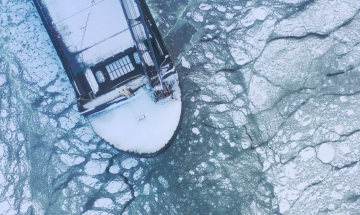ECOPRODIGI’s Future Foresight workshop and policy seminar
This November, ECOPRODIGI is happy to host two back-to-back events in Copenhagen, Denmark. Both events are targeted to stakeholders working in and with maritime industry and to those interested in the digitalisation of the industry. Participation in the events is free of charge but registration is required. To register for the events, please fill in the registration form which can be found below after the event descriptions. We look forward to meeting you in Copenhagen!
Wednesday, 20 November: ECOPRODIGI’s Future Foresight Workshop
The objective of ECOPRODIGI’s Future Foresight workshops is to create a digitalisation roadmap to increase eco-efficiency in the Baltic Sea Region maritime sector. In the second workshop organised in Copenhagen on Wednesday, 20 November, we will apply the tools from the strategic foresight toolbox to open up, explore, and map the range of plausible future trajectories. The point of departure will be taken from the 3 ECOPRODIGI cases: Vessel Performance, Cargo Logistics, and Shipbuilding. The activities will build off the work that was started in the first workshop in Klaipeda in October, but participation in the prior workshop is not a requirement.
The workshop takes place at Aalborg University Copehagen premises (AAU Sydhavn, A. C, Meyers Vænge 15, 2450 København). Any questions about the workshop can be addressed to Valdemar Ehlers: ve@danskemaritime.dk
Thursday, 21 November: ECOPRODIGI’s policy seminar “Navigating towards 2030. How to take the digital route to environmentally and economically sustainable maritime industry?”
In line with the United Nations 2030 Agenda for Sustainable Development, the International Maritime Organization (IMO) has set several objectives for the maritime industry in terms of the environmental impacts of shipping. Carbon intensity of international shipping needs to decline, with reductions of CO2 emissions per transport work by at least 40% by 2030, towards 70% by 2050, compared to 2008. Furthermore, the total annual green house gas (GHG) emissions from international shipping are to be reduced by at least 50% by 2050 compared to 2008 whilst pursuing efforts towards phasing them out entirely.
Digitalisation is among the most important technological enablers for maritime industry’s progress towards decarbonisation and eco-efficiency. However, the disruptive character of digitalisation means that there are many issues to consider and challenges to overcome before the benefits in better operational efficiency, reduced costs and improved environmental performance can be reaped. In many cases, cross-sectoral collaboration and pooling of knowledge and resources between actors from different industries and traditions are needed to find and develop digital solutions that support eco-efficiency. In addition to the development of solutions, transnational networks are often critical to support the diffusion of digital technologies and eco-efficiency solutions beyond national borders.
More information and registration here.

